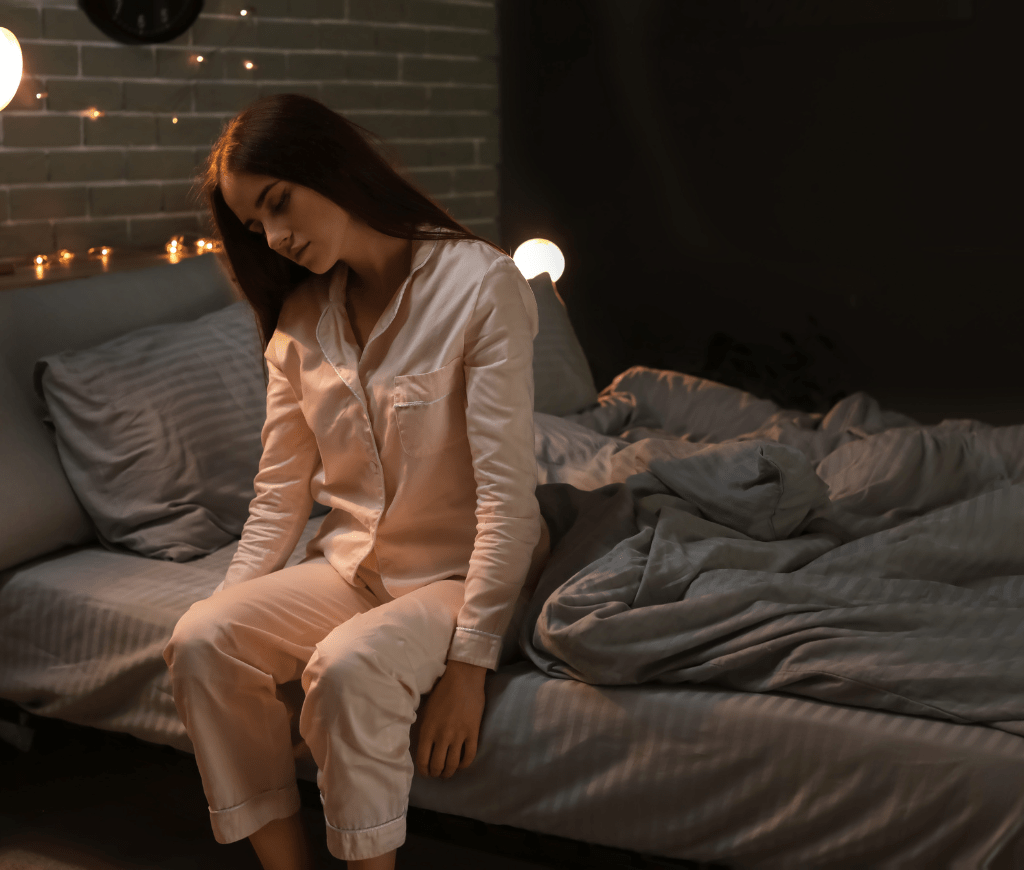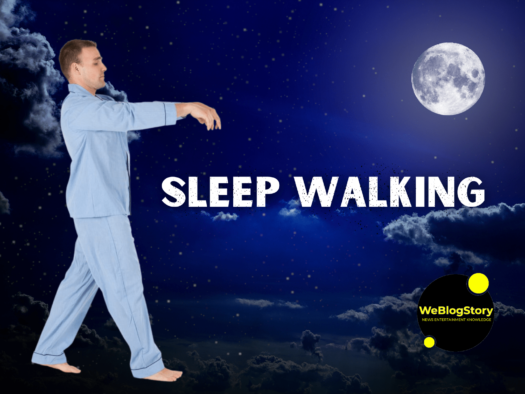What is Sleepwalking?
Sleepwalking, also known as somnambulism, is a sleep disorder in which people walk or perform other complex behaviors while they are still asleep. This is a common sleep disorder that can be frustrating and even dangerous. It usually occurs during the first few hours of the night, when people are in deep sleep.
Sleepwalking is more common in children than adults. 1 out of 5 children will sleepwalk at least once in their life. Most children outgrow sleepwalking by the time they reach puberty. However, it can also occur in adults, and it is more common in people with certain medical conditions, such as sleep apnea or narcolepsy.
What Causes Sleepwalking?
Scientists have not given the exact cause of sleepwalking yet . However, it can be caused by a number of factors, including:
Genetics:
Sleepwalking tends to run in families.
Sleep deprivation:
Sleepwalking is more likely to occur if you are sleep deprived.
Stress:
Stress can trigger sleepwalking episodes.
Medications:
Some medications, such as antidepressants and sedatives, can increase the risk of sleepwalking.
Medical conditions:
Sleepwalking can be a symptom of certain medical conditions, such as sleep apnea or narcolepsy.
What Are the Symptoms of Sleepwalking?
The symptoms of sleepwalking can change for every person. However, some common symptoms include:
- Getting out of bed and walking around while asleep.
- Performing complex behaviors, such as eating, dressing, or even driving.
- Having difficulty waking up.
- Being shook or uncomfortable when they wake up.
Is Sleepwalking Dangerous?
Sleepwalking is usually not harmful. However, it can be dangerous if sleepwalkers wander into dangerous areas, such as stairs or windows. In rare cases, sleepwalkers may even hurt themselves or others.
How Is Sleepwalking Diagnosed?
Sleepwalking is usually diagnosed based on a person’s history and symptoms. However, in some cases, a doctor may order a sleep study to rule out other sleep disorders.
How Is Sleepwalking Treated?
There is no cure for sleepwalking. However, there are a number of things that can be done to prevent or reduce the frequency of sleepwalking episodes. These include:
- You should get enough sleep which is around 7 or 8 hours a day.
- Creating a regular sleep schedule. Go to bed and wake up at the same time each day, even on weekends.
- Avoiding caffeine and alcohol before bed. These substances can interfere with sleep.
- Making sure your bedroom is dark, quiet, and cool. This will help you sleep more soundly.
- Removing any potential hazards from your bedroom. This includes things like stairs, windows, and sharp objects.
- Sleeping with a door that locks. This will prevent you from wandering out of the house.
- Wearing a medical alert bracelet or necklace. This will let people know you are sleepwalking.
- Telling your family and friends about your sleepwalking. This will help them watch out for you and keep you safe.

If you are concerned about sleepwalking, talk to your doctor. They will be able to determine the best solution for you.
Additional Information
Sleepwalking and Mental Health:
Sleepwalking is not a sign of mental illness. However, it can be more common in people with certain mental health conditions, such as anxiety and depression.
Sleepwalking and Medications:
Some medications, such as antidepressants and sedatives, can increase the risk of sleepwalking. If you are taking any medications, talk to your doctor about whether they could be contributing to your sleepwalking.
Sleepwalking and Alcohol:
Alcohol can interfere with sleep and make sleepwalking more likely. If you are prone to sleepwalking, it is best to avoid alcohol before bed.
Sleepwalking and Pregnancy:
Sleepwalking is more common in pregnant women. This is likely due to the changes in hormones that occur during pregnancy.
The History of Sleepwalking
Sleepwalking has been documented for centuries. The earliest recorded mention of sleepwalking is in a Chinese medical text from the 2nd century BC. In the Middle Ages, sleepwalking was often seen as a sign of demonic possession. In the 17th century, the English physician Thomas Willis coined the term “somnambulism” to describe sleepwalking.
In the 19th century, sleepwalking was studied by scientists such as Jean-Martin Charcot and Sigmund Freud. Charcot believed that sleepwalking was a form of hysteria, while Freud believed that it was a way of expressing unconscious desires.
In the 20th century, sleepwalking has been studied by sleep researchers using electroencephalography (EEG) and other methods. This research has helped to shed light on the brain mechanisms involved in sleepwalking.
The Science of Sleepwalking
Sleepwalking is a complex phenomenon that is not fully understood. However, research has shown that it is associated with a number of brain changes. For example, sleepwalkers have been shown to have increased activity in the frontal lobe, which is involved in planning and decision-making. They also have decreased activity in the thalamus, which is involved in regulating sleep-wake cycles.

The Treatment of Sleepwalking
There is no cure for sleepwalking. However, there are a number of treatments that can be used to prevent or reduce the frequency of sleepwalking episodes. These treatments include:
Behavioral therapy:
Behavioral therapy is a type of therapy that can help people to change their behavior. In the case of sleepwalking, behavioral therapy can help people to develop strategies for preventing sleepwalking episodes.
Medication:
In some cases, medication may be used to treat sleepwalking. However, medication is usually only used as a last resort, as it can have side effects.
Lifestyle changes:
There are a number of lifestyle changes that can help to reduce the risk of sleepwalking, such as getting enough sleep, avoiding caffeine and alcohol before bed, and creating a regular sleep schedule.
Cure for Sleepwalking
There is no one-size-fits-all cure for sleepwalking. However, there are a number of things that can be done to reduce the frequency and severity of sleepwalking episodes. These include:
- You should get enough sleep which is around 7 or 8 hours a day. Getting enough sleep can help to regulate your sleep-wake cycle and reduce the risk of sleepwalking.
- Avoiding caffeine and alcohol before bed: Caffeine and alcohol can interfere with sleep and make sleepwalking more likely.
- Creating a relaxing bedtime routine: A relaxing bedtime routine can help you to wind down before bed and make it easier to fall asleep.
- Making sure your bedroom is dark, quiet, and cool: A dark, quiet, and cool bedroom can help you to sleep more soundly and reduce the risk of sleepwalking.
- Identifying and addressing triggers: If you know what triggers your sleepwalking episodes, you can try to avoid those triggers. For example, if you find that you are more likely to sleepwalk after you have been stressed, you can try to find ways to manage your stress levels.
- Seeing a doctor: If you are concerned about your sleepwalking, you should see a doctor. They can rule out any underlying medical conditions and recommend other treatments that may be helpful.
If you follow these tips, you may be able to reduce the frequency and severity of your sleepwalking episodes. However, it is important to remember that there is no one-size-fits-all cure for sleepwalking. If you are struggling with sleepwalking, it is important to talk to your doctor which will decide the best solution for you.
The Impact of Sleepwalking on Relationships and Work
Sleepwalking can have a significant impact on relationships and work. For example, sleepwalking can lead to accidents, injuries, and embarrassment. It can also disrupt sleep for other people in the household.
If you are concerned about the impact of sleepwalking on your relationships or work, it is important to talk to your doctor. They can help you to develop strategies for managing your sleepwalking and minimizing its impact on your life.
Conclusion
Sleepwalking is a common sleep disorder that can be frustrating and even dangerous. However, there are a number of things that can be done to prevent or reduce the frequency of sleepwalking episodes. If you are concerned about sleepwalking, talk to your doctor.
Read More Amazing Blogs like these –> LINK
If you wanna read informative blogs –> LINK
If you wanna read health blogs –> LINK




Awesome! Its genuinely remarkable post, I have got much clear idea regarding from this post
Very well presented. Every quote was awesome and thanks for sharing the content. Keep sharing and keep motivating others.